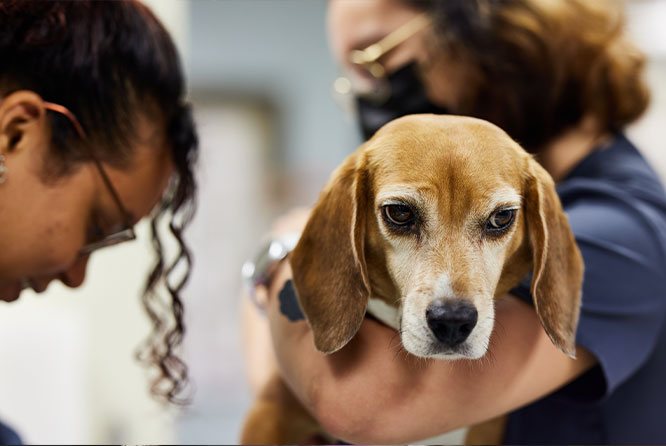Canine Influenza — What You Need to Know

By Dr. Graham Bilbrough, VP, Clinical Education & Medical Marketing
Two canine influenza A viruses — H3N8 and H3N2 — have sporadically affected veterinary teams in several states across the United States. Canine influenza, or dog flu, is highly contagious. According to the AVMA, approximately 80% of dogs exposed to flu develop clinical signs of disease. The remaining 20% of infected dogs are asymptomatic but can still spread the virus. While these canine flu strains currently pose little threat to humans, dogs infected with this influenza A strain can become seriously ill if not diagnosed and treated correctly.
Canine Influenza Resources to Help Keep Pets Safe
As you keep your clients safe and well-informed, we’ve assembled a few quick facts and resources to support you.
Be aware of local outbreaks.
The Companion Animal Parasite Council (CAPC) has a library of excellent resources where you can track canine influenza cases at the county level. We provide our diagnostic data to CAPC, which they combine with data from other diagnostics providers, to deliver an accurate, timely view into local threats, which are updated frequently. I highly recommend it.
If there’s an outbreak in your region, client education is key.
Flu most often spreads in areas where dogs are in close quarters with other dogs, such as kennels and shelters. I’m personally concerned about dogs who frequent “doggie daycare” or regularly visit dog parks. Is the dog walked in a group of dogs by a professional dog walker? These are all good questions to ask pet owners if they’re concerned.
While primary transmission occurs through respiratory droplets when infected dogs sneeze or cough, contaminated surfaces can also contribute to the virus’s spread. An outbreak offers an opportunity to remind pet owners of the importance of keeping dogs current with their vaccinations. While the dog flu vaccine is always a good option for at-risk dogs or concerned clients, it’s important to communicate that dogs who receive the flu vaccine can still contract influenza.
However, they’re at a much lower risk of serious illness. Encourage pet owners to ask boarding and daycare facilities if they require dogs to be vaccinated against flu to prevent transmission. This is a promising trend that may help contain outbreaks when they occur.
Know the signs, severity, and when to test.
Dogs with the flu present signs that are similar to humans with the flu — sneezing, coughing, fever, runny nose, and fatigue. Most dogs recover within weeks or even sooner. Others, however, can develop more severe illness and secondary infections such as pneumonia, which can sometimes be fatal.
Fortunately, according to the CDC, no human infections with canine influenza have ever been reported. However, like humans, we can test dogs for the flu, and for some, this is a good idea. Antech offers a Canine Respiratory PCR panel (code T995 US; code CT995 Canada) that detects canine influenza virus (H3N8), pan influenza (detects all influenza type A, including H3N2; when positive, confirmation by H3N2 specific qPCR), H5N1 influenza virus, canine adenovirus type 2, canine distemper virus, canine herpesvirus, canine parainfluenza virus, canine resp. coronavirus, Bordetella bronchiseptica, Mycoplasma cynos, and Streptococcus equi subsp. zooepidemicus. This Canine Respiratory PCR panel can help veterinary teams manage individual patients and regional outbreaks.
Like all health concerns, knowledge is key. We’re monitoring for outbreaks and encourage you to do the same. If you have any questions about our canine influenza diagnostics, don’t hesitate to reach out.
Blog Posts Straight to Your Inbox!
Tune in monthly to read our blog post or give us your email to send straight to your inbox.



